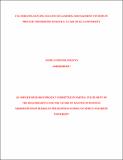Factors influencing success of Learning Management Systems in private universities in Kenya: a case of KCA University

View/
Date
2018-07Author
Omanyo, Joshua Omondi
Type
ThesisLanguage
enMetadata
Show full item recordAbstract
Learning Management Systems (LMS) are gaining an increasing popularity in many universities in Africa as institutions implement them with the target of their advantage in improving efficiency, flexibility and customization of program delivery. Despite the high setup costs and contrary to their expectations, many of the institutions have not achieved the intended benefits due to such reasons as extremely low usage; very limited use of features in the systems; poor performance of LMS students; high attrition rates in this mode of study; and faculty negative attitude to the LMS due to inconsistencies with their teaching methodology. This study adopted Technology Acceptance Model and Extended DeLone and McLean information system success model in examining the factors critical to the success of the LMS in private universities with a specific focus on KCA University. The objectives of the study were to establish the effects of the quality of uploaded materials on the success of LMS in Private Universities in Kenya; to determine the effects of system quality on the success of LMS in Private Universities in Kenya; to examine the effects of user support on the success of LMS in Private Universities in Kenya; and to determine the role of the instructor in the success of LMS in Private Universities in Kenya. The study employed a descriptive research design with the target population comprising the 528 students who were undertaking various courses via the LMS. Stratified random sampling technique was employed based on the number of students in the diploma, undergraduate and postgraduate levels with a sample of 220 students used to carry out the study. Online questionnaires were used as data collection tool and data analysis was conducted using Statistical Package for Social Sciences with descriptive statistics used to summarize present the data. Empirical analysis was conducted to investigate the relationship between the independent factors and the dependent variable. Results of data analysis indicated that all independent variables had a positive and significant effect on the level of success of LMS. The findings of the study showed that quality of learning materials was the most significant determinant of success of the LMS. System quality and user support also showed significant positive relationship with success of the LMS with instructors’ role showing the least significance of all. Based on these findings, the researcher recommends thorough market research and stakeholders involvement to ascertain that the systems acquired most closely fit their education needs; alignment of learning content to learning outcomes and relevance to the learning environment; competent technical staff be hired in the LMS support units; and LMS instructors be transformed into effective online facilitators. A further study involving students drawn from other private universities should be carried out so as to more confidently generalize the study to other private universities in Kenya.
Publisher
Africa Nazarene University
Subject
Learning Management SystemsPrivate Universities
Learning Management Systems--Success
Learning Management Systems --KCA
